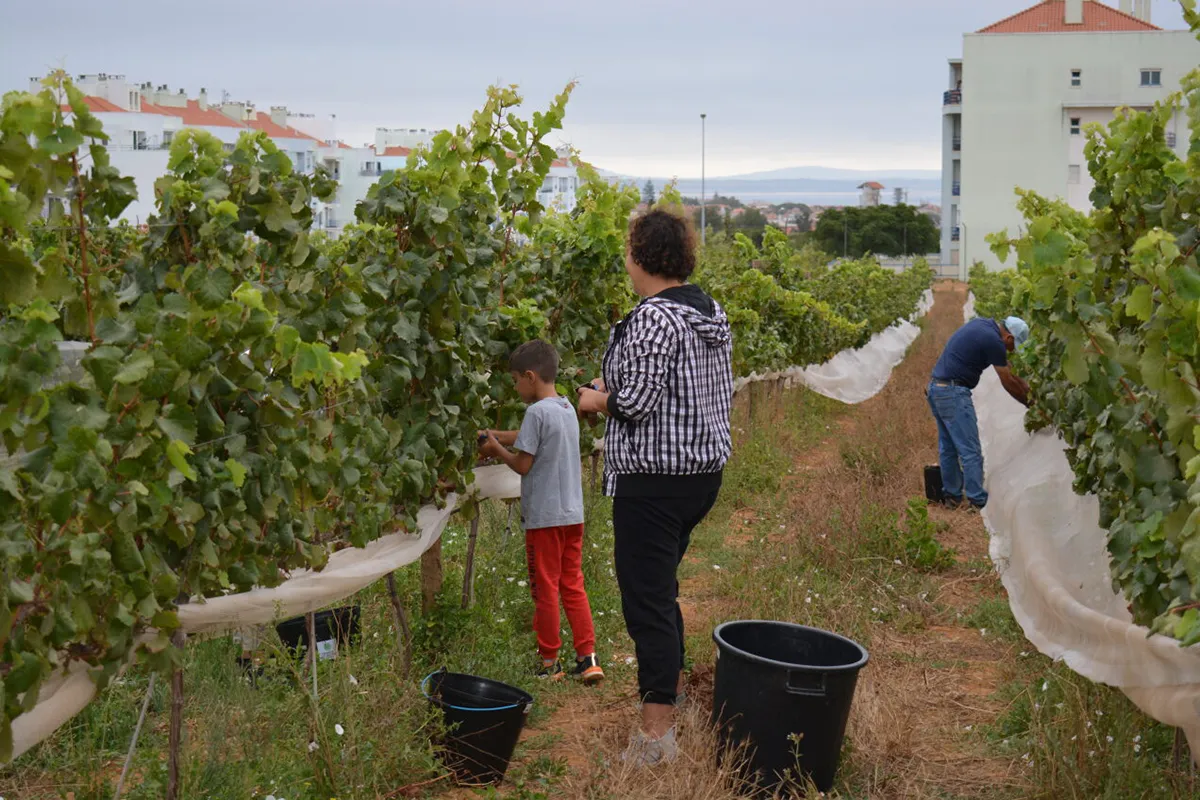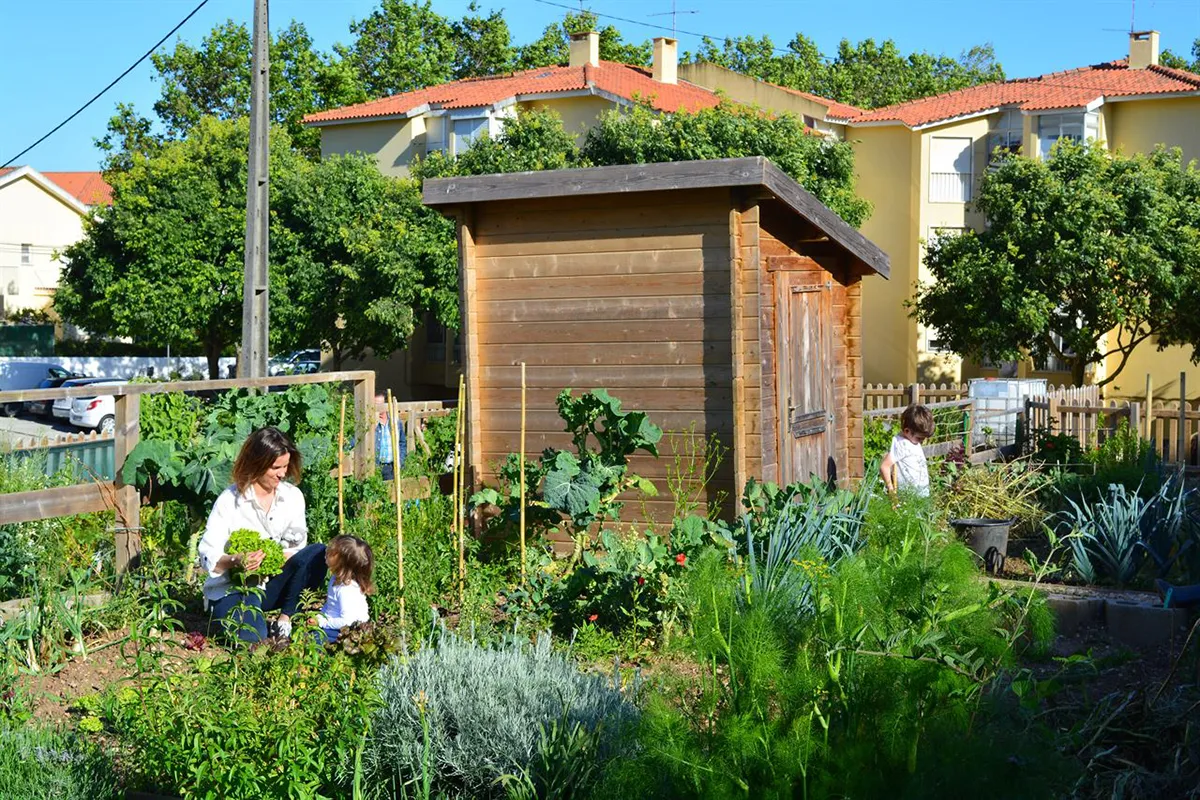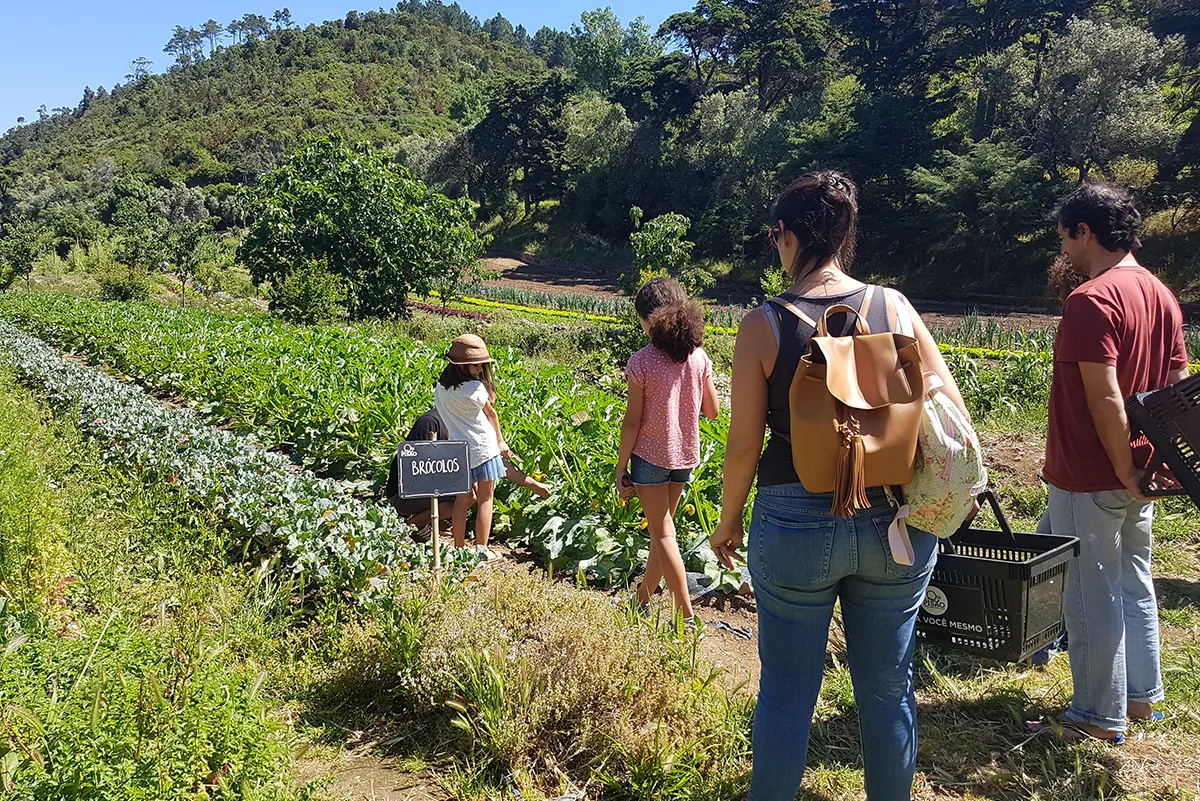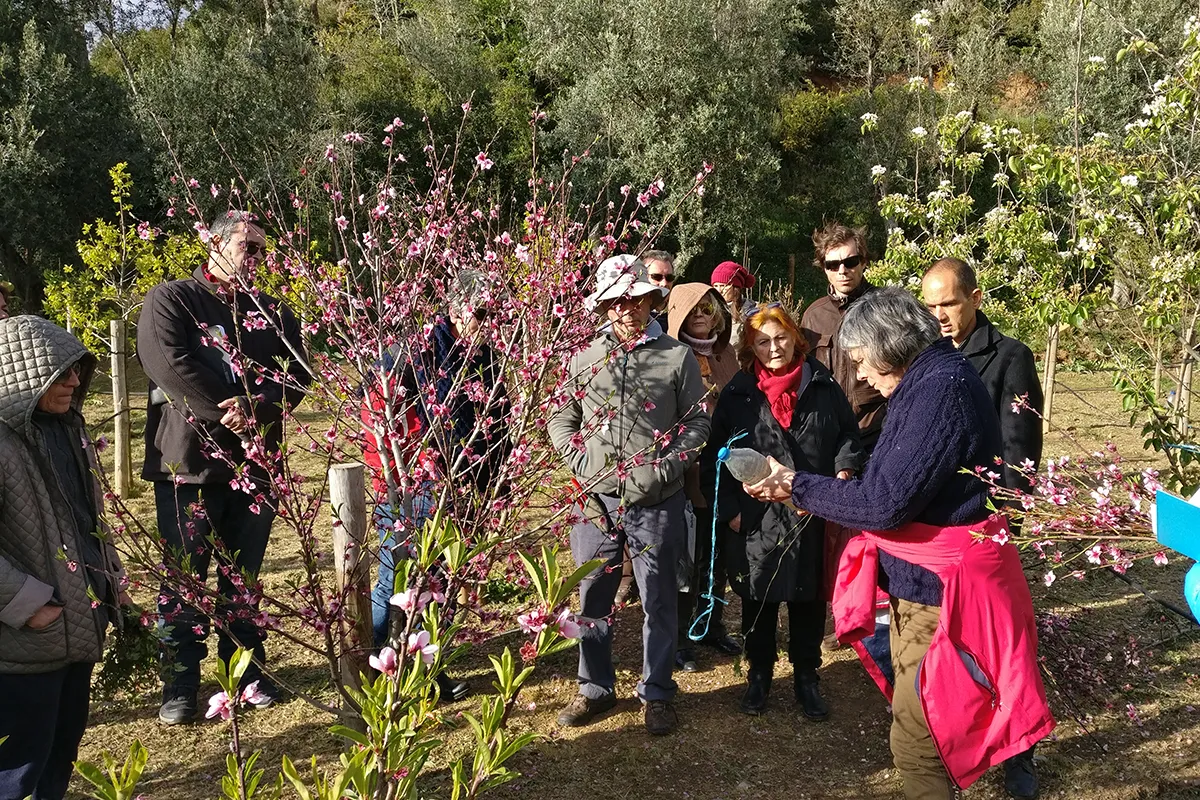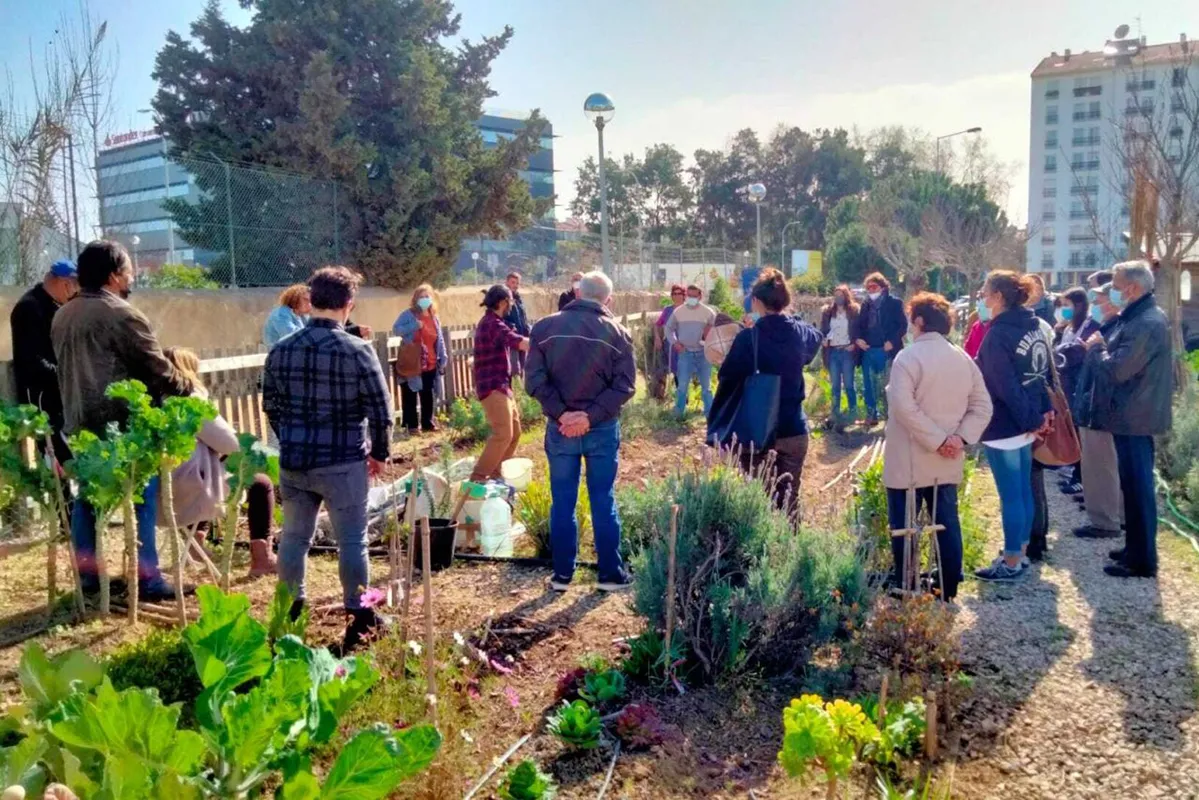Benefits of Urban Greening
Harnessing the Power of Plants
There exists an extensive array of studies demonstrating the advantages of community vegetable gardens for urban residents. While the primary benefit is the localised production of nutritious, organic food, numerous other advantages encompass aspects of health, therapeutic effects and fostering a sense of community, among others (Ohmer, Mary L., et al., 2009). In Cascais, researchers have demonstrated: 1) the benefits of urban vegetable gardens in enhancing biodiversity, when compared with other public green spaces like gardens and parks (Lisboa, 2016); 2) the contribution to the municipality’s sustainability (Abreu, 2012); 3) the contribution to promoting physical and mental health and wellbeing of non-institutionalised individuals (Lampert, 2021); or 4) the positive influence these projects have in creating more sense of belonging (Barata, 2017).
In a future characterised by climate change, frequent occurrences of extreme weather, and an unpredictable global trade market that could potentially lead to significantly higher food costs, cities that have already established food production programs and can actively engage their population are undoubtedly better equipped to address the challenges posed by climate change. From a social standpoint, this initiative has demonstrated its effectiveness as a potent tool against the rising issues of isolation and loneliness, which regrettably are escalating worldwide, particularly within major urban centres. The Terras de Cascais strategy has successfully rekindled a sense of community belonging among numerous individuals, both young and elderly, living in Cascais.
Delivering Multiple Benefits
Within the context of community food production, a wide range of individuals engage in cultivating plants, each propelled by a diverse set of motivations and objectives. When investigating the driving factors behind our gardeners’ participation, a noteworthy 79% highlighted “access to organic food” as their primary aspiration. Furthermore, 53% expressed the intention “to make use of my leisure time,” 36% emphasised “establishing stronger community connections,” 31% prioritised “reducing food-related expenditures,” and 30% acknowledged “therapeutic reasons” as their foundational motivation. These statistics vividly demonstrate the multifaceted advantages of growing food locally.
From an ecological perspective, studies have demonstrated that community gardens yield superior outcomes in terms of enhancing local biodiversity. Additionally, they serve as sites for effective water infiltration and contribute to the amelioration of local climate conditions.
Three years after the first community garden was built, the administrative body recognised the importance of establishing a dedicated division exclusively focused on urban agriculture within Cascais. Human resources were employed to oversee the management of community gardens, and specific financial resources were earmarked for this purpose. The nascent team became an integral sub-department of the Green Public Spaces Department, seamlessly integrating into the city’s comprehensive planning framework. A decade has since transpired, witnessing a progressive augmentation in the allocated budget and a commensurate expansion in the array of initiatives spearheaded by the Terras de Cascais team.
The City’s Bold and Innovative Vision
Terras de Cascais presents an innovative approach to urban farming for several reasons.
Urban Planning Integration: Terras de Cascais has seamlessly integrated urban community gardens into its urban planning strategy, establishing itself as a key player in the development of urban production sites.
Inclusive Application Process: The initiative maintains an ongoing waiting list that welcomes applications from individuals at any time, ensuring equal access and opportunities for all. This approach not only ensures fairness but also provides decision-makers with insights into the project’s popularity, fostering a sense of responsibility and encouraging political support.
Comprehensive Food System Strategy: The initiative boasts an ambitious, cohesive and forward-looking strategy that encompasses the entire food system. This strategy facilitates the development of new initiatives that expand the initiative’s scope. In addition to the community gardens, which serve as spaces for recreational agriculture, Terras de Cascais has developed projects designed to achieve professional reintegration, provide food assistance to vulnerable communities, foster entrepreneurship, promote local food chains and enhance food education.
Dedicated Team and Stable Budget: Backed by a dedicated team of ten individuals, Terras de Cascais operates with a well-defined and planned budget. This structural stability equips the initiative with the ability to work towards its long-term vision with consistency and effectiveness.
Only Organic: All the food grown in Cascais is organic, free of synthetic pesticides and fertilisers. It is a challenge to keep this principle, especially when new and bigger projects are implemented but, so far, we have been able to comply with it.
Partnerships and Collaboration
Terras de Cascais works permanently with the following stakeholders:
Local Businesses and Restaurants: direct supply of fresh, locally grown food.
Schools and Educational Institutions: an ongoing project dedicated to promoting vegetable gardens at schools and educational institutions that offers experiential learning opportunities for students. Students gain hands-on experience in gardening, fostering a connection to nature and healthy eating habits. Nowadays, there are 48 institutions in the program.
Nonprofit Organisations: partnerships with many nonprofits focused on food security and community development. Every week, food is donated to these organisations to help alleviate food scarcity in vulnerable communities.
Ministry of Justice: One prison farm of around one hectare where the prisoners work in close contact with nature and receive a salary for their work. All the vegetables they produce are donated to nonprofit food-aid organisations.
Corporate Partners: Partnerships with corporate entities interested in corporate social responsibility (CSR) initiatives. We offer team-building workshops, volunteer opportunities and educational sessions.
Universities and Research Centres: A close relationship with scholars, with whom we partner with to launch new research and innovation projects related to urban gardening and the food system.
These examples illustrate how our strategy collaborates with stakeholders from various sectors to create a more holistic and impactful approach to urban farming. By working together, these initiatives can foster community engagement, support local economies, promote education and contribute to the wellbeing of residents.
Addressing Urban Challenges
The Issue
This strategy addresses diverse issues, each with its own unique characteristics. From a social perspective, Cascais is confronting the ongoing challenge of a rapidly ageing population, a situation shared by many other cities across Portugal and Europe. This situation presents us with the task of finding ways to encourage a wholesome way of living and to facilitate a joyful ageing process.
The elderly population grapples with two predominant challenges: the feelings of loneliness and sedentarism. Without the implementation of such initiatives, we would inevitably confront a burgeoning problem of social isolation, potentially leading to a less healthy older population.
We can also pinpoint the fact that a significant portion of Cascais’ population originates from rural regions of Portugal, where agriculture holds a central role in their traditions and way of life. While quantifying the impact of urban migration on one’s sense of identity might be challenging, the significance of maintaining a connection with the land is readily apparent.
The Impact of the Issue
Viewed through an ecological and landscape lens, the relentless expansion of urbanisation in Cascais would inevitably erode the residents’ quality of life if the creation of productive green spaces were not a priority. These spaces are not only pivotal for enhancing the residents’ quality of life but also crucial for preserving the overall environmental health. The absence of such spaces would lead to diminished biodiversity, reduced water infiltration, and a diminished capacity to mitigate the local climate impacts.
The introduction of community gardens has proven to be a particularly significant initiative in promoting beneficial activities among the older population. By engaging in such activities, the elderly find a sense of purpose, a feeling of belonging, and a means to counteract loneliness.
Regarding urban migration and the problems that come with it, cultivating food not only serves as a means of sustenance but also represents a powerful act of reconnecting with one’s cultural heritage and embracing one’s origins once again. Without this initiative, we would probably have a higher incidence of mental health problems in our society, such as depression or anxiety.
A Nature Orientated Future
The emergence of community gardens has marked a significant shift, evidenced by a surge in demands for this specific kind of green haven, surpassing the requests for any other type of space. This phenomenon strongly indicates that incorporating food production sites within the city fabric serves as a more effective strategy to safeguard the remaining green expanses.
Growing organic food in the city is then urgent because it promotes sustainability, reduces carbon emissions from transportation and enhances food security. It minimises the use of harmful chemicals, conserves water and fosters a connection between urban dwellers and their food sources. This local, organic production method contributes to healthier diets, supports local economies and mitigates the environmental impact of conventional agriculture.
Nature Positive Solutions
Implementation
Terras de Cascais strategy has been implemented progressively, starting with the Community Vegetable Gardens project in 2009. By 2015, there were already 10 gardens established, alongside the Schools Vegetable Garden project. In 2018, we introduced the Terras de Cascais strategy, the initiative we are currently presenting. By that point, we had already established the Quinta do Pisão Organic Vegetable Garden, where visitors can harvest vegetables and fruits, the Land Bank – an online platform where landowners and land seekers could come together, and the Community Vineyards and Orchards project.
The Terras de Cascais strategy emerged to encompass various projects. It signified the commitment to engage with the entire food system, embracing initiatives with diverse objectives, such as:
- Shifting the food paradigm towards a localised, healthy and organic community-based food system.
- Establishing environmentally-friendly businesses and encouraging the establishment of new urban professional farmers.
- Maximising the benefits of food cultivation, including poverty reduction, therapeutic effects, environmental enhancement and more.
- Reduce and recycle food waste.
Since 2018, the Terras de Cascais strategy has generated new projects, including: a) The “Horta do Brejo” Prison Farm, where imprisoned women cultivate vegetables and fruits for donation. b) The “Mosteiro Santa Maria do Mar Vineyard” – an organic and regenerative vineyard dedicated to revitalising the nearly-lost Vinho de Carcavelos wine. c) Various collaborative initiatives addressing topics like short food circuits and traditional cereal varieties. d) An additional 10 Community Vegetable Gardens, 3 Community Orchards, and 2 Community Vineyards.
Feasibility
In terms of financial support, Terras de Cascais operates with a dedicated budget that remains consistent from year to year. Since 2018, the team has expanded with the addition of two more employees. When developing a new project, the team actively seeks funding opportunities. Typically, the budget for a new project is sourced from both the city council and external funding options.
Logistical assistance is provided through the resources of the city council, encompassing vehicles, trucks, materials and technical expertise that bolster our initiatives.
Since the initiation of our program, food production sites have been seamlessly integrated into the city’s design and planning. These sites have gained priority during the construction or revitalisation of green spaces.
Multi-Stakeholder Support
The Terras de Cascais strategy involves collaboration with various stakeholders, including:
Non-profit organisations: We partner with these organisations to jointly implement community projects and allocate a portion of the food produced in our vegetable gardens for donation.
Universities and research centres: Collaborating with these institutions allows us to conceptualise and execute new projects that contribute to research and innovation.
City council departments: We receive support from different departments within the city council, encompassing transportation, machinery and technical assistance, which aids our logistical operations.
Educational institutions: Our partnership with schools, kindergartens and after-school centres serves as a means to educate future generations about food and its significance.
Neighbourhood associations: By collaborating with these associations, we establish new community gardens, fostering a sense of shared ownership and involvement within the local community.
This diverse range of partnerships across sectors and levels of society showcases their holistic and integrated approach.
Management and Maintenance
The Terras de Cascais strategy has been meticulously crafted and executed to guarantee the efficiency, effectiveness, and sustainable management and maintenance of its endeavours, while also ensuring the city’s capacity to provide ongoing support. In summary, the Terras de Cascais approach to design and implementation has been marked by strategic resource allocation, collaboration with diverse stakeholders, integration into urban planning, education, adaptability and strong city council support. These factors collectively ensure that the initiative’s management and maintenance needs are met efficiently, effectively and in a sustainable manner, while also enabling the city to provide consistent support. Challenges have been met through flexible funding strategies, collaborative problem-solving, and the utilisation of the initiative’s extensive network of partners.
Measuring and Reporting Impact
Monitoring Results
Our team has established a set of protocols to systematically monitor the impact of the Terras de Cascais strategy. These protocols encompass the following areas:
We consistently gather data regarding the various projects integrated within the strategy. For instance, in the case of Community Gardens, we compile information on the frequency of visits to each garden, among others. This data is daily updated at www.terrasdecascais.pt.
We have defined a series of KPIs for each project’s objectives. These indicators encompass a range of metrics, such as the extent of cultivated land, quantities of food produced, the number of community events or workshops conducted, or the number of participants.
We collaborate closely with researchers who delve into the initiative’s ecological impact. Multiple studies have been conducted, yielding insights into the measurable environmental effects of the initiative.
We’ve established a set of objectives, backed by our KPIs, which serve as guiding principles for our efforts in fostering a nature-positive impact within our region and building a more sustainable food system:
Draw more individuals into our initiatives, whether they become new gardeners or active participants in our events. Growing community involvement enhances our capacity to effect change.
Every additional hectare under our stewardship is an additional hectare dedicated to organic and regenerative food production. Our goal is to secure more land for these sustainable practices.
Advancing farming techniques that promote local biodiversity, soil restoration and the capture of carbon dioxide. These practices contribute to the overall ecological health of our region.
Demonstrating Progress
The monitoring protocols outlined above significantly enhance our ability to showcase and quantify the progress made through the Terras de Cascais strategy. Measurable progress plays a pivotal role in substantiating the initiative’s effectiveness and impact, enabling us to illustrate the tangible benefits achieved. This, in turn, has a profound impact on various aspects:
Demonstrating Effective Implementation: The systematic collection of data, encompassing various aspects from community engagement to financial performance, allows us to vividly illustrate how the Terras de Cascais strategy is being effectively implemented on multiple fronts. The best example is the ever-growing waiting list, which shows the constant and growing people’s wish to grow food in the city. Sharing these insights showcases a commitment to openness and allows stakeholders, including city officials and the public, to assess the initiative’s progress firsthand.
Supporting Expansion of Greening Ambitions: Measurable progress is a potent tool to advocate for the expansion of greening ambitions within the city. Demonstrating successful outcomes through quantifiable data establishes a strong case for further investment and scaling up of existing projects. It showcases the positive impact of sustainable initiatives and encourages decision-makers to allocate resources towards broader greening endeavours.
Attracting Interest and Funding: Concrete evidence of the Terras de Cascais strategy’s impact is attractive to potential collaborators, partners and funders. Measurable progress lends credibility to the initiative’s goals and achievements, making it more appealing for external organisations to engage in partnerships or provide funding.
Measuring Impact
In terms of quantitative achievements, we can highlight the following:
- The cultivation of 17.6 hectares under the Terras de Cascais program.
- 2 market gardens, one within a prison and another opened to the public with a “pick your own” system.
- 34 Community Vegetable Gardens, with 732 plots allocated to participants.
- 5 Community Orchards, with 37 plots allocated to participants.
- 4 Community Vineyards, with 26 plots allocated to participants.
- Dedication of 8.5 hectares of land to the production of old varieties of cereal.
- Cultivation of 2.7 hectares of vineyard dedicated to the prestigious Vinho de Carcavelos.
- Implementation of approximately 50 school vegetable gardens.
- Participation of around 2,000 people in our Organic Horticulture Course.
- Around 1,900 people interested in cultivating a plot of land (the number of subscriptions on the waiting list).
As for the qualitative accomplishments, we can highlight the following:
- The integration of urban farming into the fabric of Cascais, becoming an integral part of its identity.
- Consistent inclusion of community food production sites in urban planning, making them highly desirable green spaces within the city.
- Agroecological farming practices, making organic farming the predominant mode of production.
- Promotion of a stronger sense of community, as our green spaces have become gathering places for people.
- Improved access to nutritious and healthy food, along with an increased interest in good food.
- Reduction in urban environmental degradation, with numerous plots of land being transformed into green, biodiverse and multifunctional spaces.
- Higher levels of food system education within our society.
Learning and Transferability
Adaption and Enhancement
Initially, the initiative was designed following the examples of other cities with similar projects, but it was constantly adapted to the local reality. Many things have changed since we started and adaptations have been made to correct many of the things that were not working properly (e.g. the size of the plots, the number of plots inside each community garden or the monitoring process). We can pinpoint the main things that changed in response to the monitoring of progress:
- We have created a coherent methodology to monitor the almost 800 plots of land assigned to people which has resulted in a digital program that helps the team member keep track of everything that needs to be monitored.
- We have started to apply for national and European funding programs since we understood the importance of diversifying the sources of financing.
- We have created strategic partnerships in order to have more people involved that could bring added value to the initiative.
External stakeholders have made it possible to 1) have a better social impact – the NGOs we work with distribute many of our products to the most vulnerable people; 2) have a better ecological impact – the universities we work with and other partners, like farmers, have helped us implement better farming practices; 3) reach a wider public and scope of action – we have partnered with cooks, bread makers and hotels to make food events and reach a wider audience.
Potential for Replication
Growing plants has become easier for everyone. Having a place to grow plants has changed how people use green spaces in their city. It allows them to be more connected to public spaces, improving their health and recreation. It also shows that creating more green spaces can be cheaper when people help maintain them. These places are not only cheaper but also better for the environment because they boost local biodiversity more than regular public gardens. They don’t use harmful chemicals, which protects the soil and local ecosystem. Nowadays, community gardens are essential when designing new public green spaces.
We’ve been sharing what we’ve learned with scholars and other city councils working on urban agriculture projects, with our project being referenced as a good practice nationally and internationally. The most significant change our project caused was that now when planning new green spaces in the city, there is always a focus on including a place to grow food.
Inspiring Other Cities
The Terras de Cascais initiative has sparked significant interest from other cities, since we serve as both a successful model for urban greening and a source of inspiration for sustainability efforts. We have been invited to participate in several conferences and referenced in writings about the subject. This appeal lies in its measurable achievements, adaptability and potential to inspire.
The initiative’s flexibility allows other cities to tailor it to their unique circumstances. Urban agriculture can adapt to diverse agricultural traditions, environmental challenges and community dynamics.
Our focus on agroecology, organic farming and environmental regeneration aligns with global sustainability goals. Cities seeking to enhance food security, reduce ecological impact and build resilient communities find inspiration in their accomplishments.
Beyond results, the initiative offers valuable insights into best practices. Knowledge gained from Terras de Cascais can guide other cities, helping them navigate challenges and make informed decisions in their greening endeavours.
Resilience
Reducing Negative Impacts and Ensuring Sustainability
The initiative was designed to have almost zero carbon footprint and ensure long-term sustainability. The inherent characteristics of the initiative are thought to be the most positive for the environment, since we:
- Follow agroecological farming practices, with zero use of synthetic fertilisers and pesticides, making organic farming the only mode of production.
- Implement composting systems and sustainable soil management practices. Healthy soil sequesters carbon, contributing to carbon neutrality and soil carbon sequestration.
- Give courses and other education programmes to raise awareness about sustainable practices and the importance of reducing carbon footprints in daily life.
- During the design process, we have outlined the importance of reducing the gardeners’ transport emissions when moving to the community gardens, so we have defined a specific distance within which a gardener can move from his residence to the cultivated plot. We have also been working on the implementation of a system that can give gardeners access to good quantities of wood chips, to keep the soil covered the whole year.
Regarding the efforts to ensure long-term sustainability of the positive outcomes, we can highlight the fact that we have been partnering with other stakeholders to diversify our scope of action and funding source.
Environmental Considerations
We have implemented since the beginning the first rule of the project: everything is grown organically with integrated regenerative practices which guarantees a sustainable use of natural resources.
The vegetable community gardens prioritise a diverse range of species to enhance local biodiversity, which fosters ecological resilience and supports pollinators.
The initiative implements comprehensive recycling and waste reduction strategies, such as: the composting systems present in every community garden; the use of production waste from other companies (the case of the algae from Wissi and the mushroom bags from Nãm) to help enhance soil nutrition; the use of woodchips produced from the cleaning of the local forest.
Whenever possible, plants and materials are locally sourced, reducing the carbon footprint associated with transportation.
These considerations are integral to the Terras de Cascais initiative’s ethos, ensuring that its impact on the environment is consistently weighed in decision-making processes. By emphasising biodiversity, sustainable water management, composting and eco-conscious procurement, the initiative not only minimises its environmental footprint but also serves as a model for responsible urban sustainability practices.
Use of Natural Resources
We continuously try to use only local resources and maintain the circularity of the project. A few examples that can represent it are:
Recycling of organic residues at every community garden, using thermophilic composting bins and worm composting systems;
Reuse of garden prunings and forest management residues to cover the soil in our vineyards, orchards and vegetable gardens
We are making an effort to use groundwater instead of potable grade water and have a few places where we use groundwater to water the plants.

















